You have an idea for a piece of software that will boost your business or career. The next step you are taking is hiring developers to make it real. You must have dozens of questions regarding that: Who should you hire? How much will the project take? What should you include in the contract and how does this whole contract thing works? How do you pay and how much?
We know all those questions can be overwhelming, and in the next several minutes we’ll give you the answers to almost all of them.
The magic solution to the chaos in your head would be getting the right type of contract. A software development contract is an agreement that not only defines the terms and conditions. It also gives you access to professionals dedicated to the highest quality of your product.
It can give you the ability to:
- track the progress of your piece of software;
- make adjustments on the go;
- communicate with your team;
- get reports;
- participating in sync-ups;
- and so much more.
So, let’s start with the most important thing – choosing the right type of software development contract.
Just like with renting a home, where you wouldn’t move in without knowing how much you should pay and what exactly you get for your money. You shouldn’t start the project without knowing all the ins and outs.
In other words, you need to know all the details and have a clear vision of your expectations. If you don’t have one yet, no worries – we’ll be able to help you here as well.
Let’s start, shall we?
Types of software development contracts
So, there are 3 types of software development contracts: Fixed Price, Time & Material (T&M), and Dedicated Team.
The process of choosing them is pretty straightforward – it depends on the duration of your project, its scope, and your budget. It also depends on your additional preferences, but we’ll talk about those later. No matter which type of contract you choose, it includes the same stages of the development process:
Estimation → Proposal → Contract → Discovery stage → Development → Testing → Release → Maintenance

Fixed Price
This is a perfect solution for projects that last up to 2 months and are clearly defined. It means the project has clear documentation, a defined project scope, terms and conditions, and, of course, a deadline.
The perks of it are obvious – time-wise you’ll have it when you expected. If you planned to receive your brand-new piece of software on the birthday of your mother-in-law, it will be released on that day with absolutely no surprises.
For this contract type, we’ll be using the technology we’ve used multiple times before (see them as templates), and thus we can deliver your project fast. However, the very nature of the project implies that all the requirements are given at the beginning of it, so there is not much flexibility here.
You wouldn’t be able to change much on the go, but you can prepare a bottle of champagne and just wait for the completion date. We know how unnerving that could be… this is why we will keep you updated on all the development progress that is happening in your project. You will also be able to chat with the developers throughout the project time.
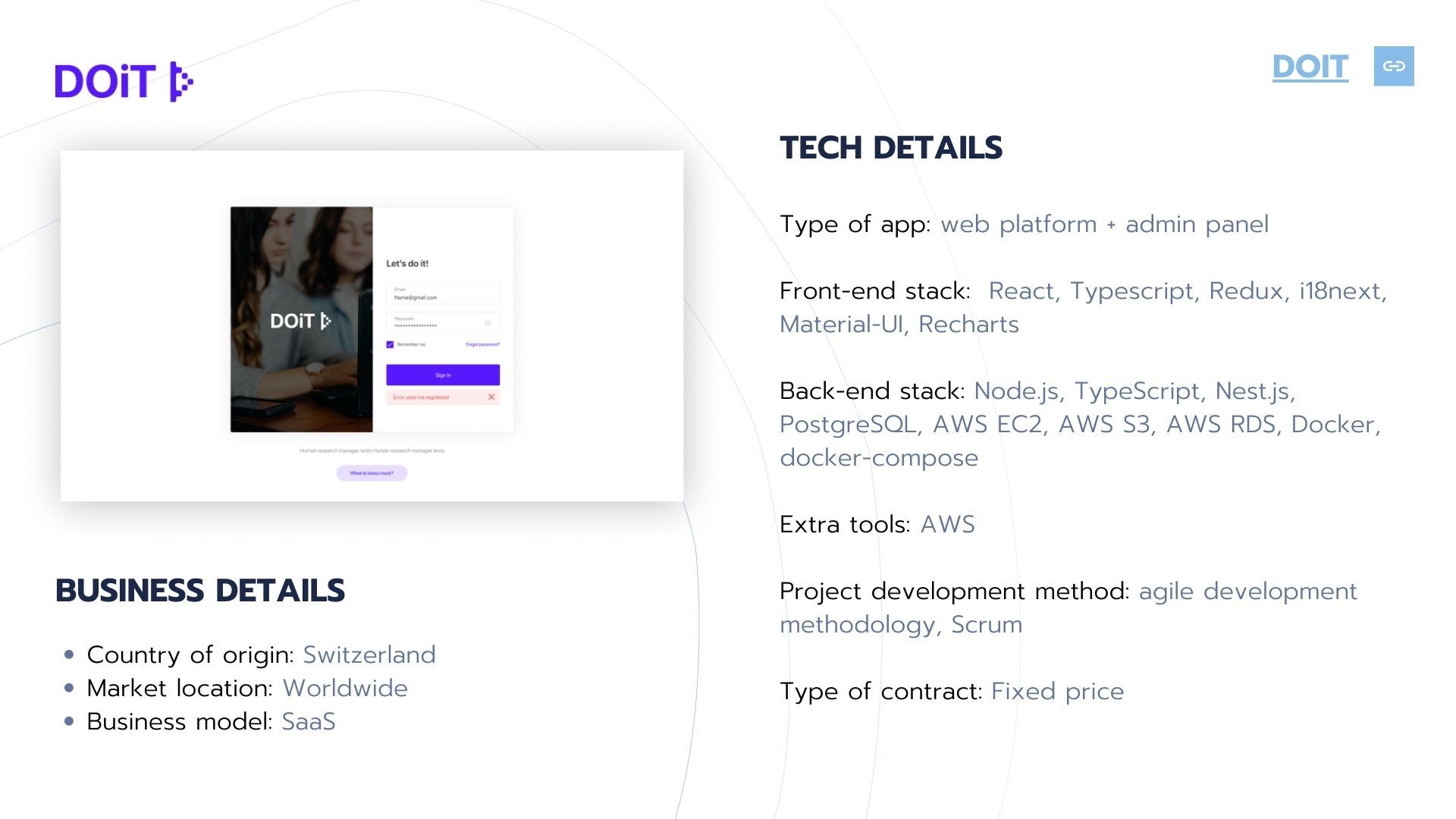 Fixed price project example: DoiT Case
Fixed price project example: DoiT Case
So let’s sum it up.
If your project:
- less than 2 months;
- has a limited budget;
- has clear documentation (our team will make sure it’s all nice and neat);
- requires the technology that we’ve used before;
- has a deadline.
We’ll recommend you to choose fixed price type of software development contract.
Before signing a contract, you’ll see a proposal. That will give you clarity on your project and will allow us to start working on it right away.
Your proposal will have the following:
- The final price and the timelines of the project.
- Project assumptions (basically, conditions in which the project will be being developed).
- Risk assessment and risk mitigating plan (~15-20%).
- The details of a fixed-price contract (most of which were mentioned above).
- What you get in the package (weekly demo, chat with programmers, etc)
When you read the proposal and you approve it, we can move on to creating your project.
If you don’t have some of these (or you feel like you’ll need to make adjustments to your project during the process) another type of contract might be right for you.
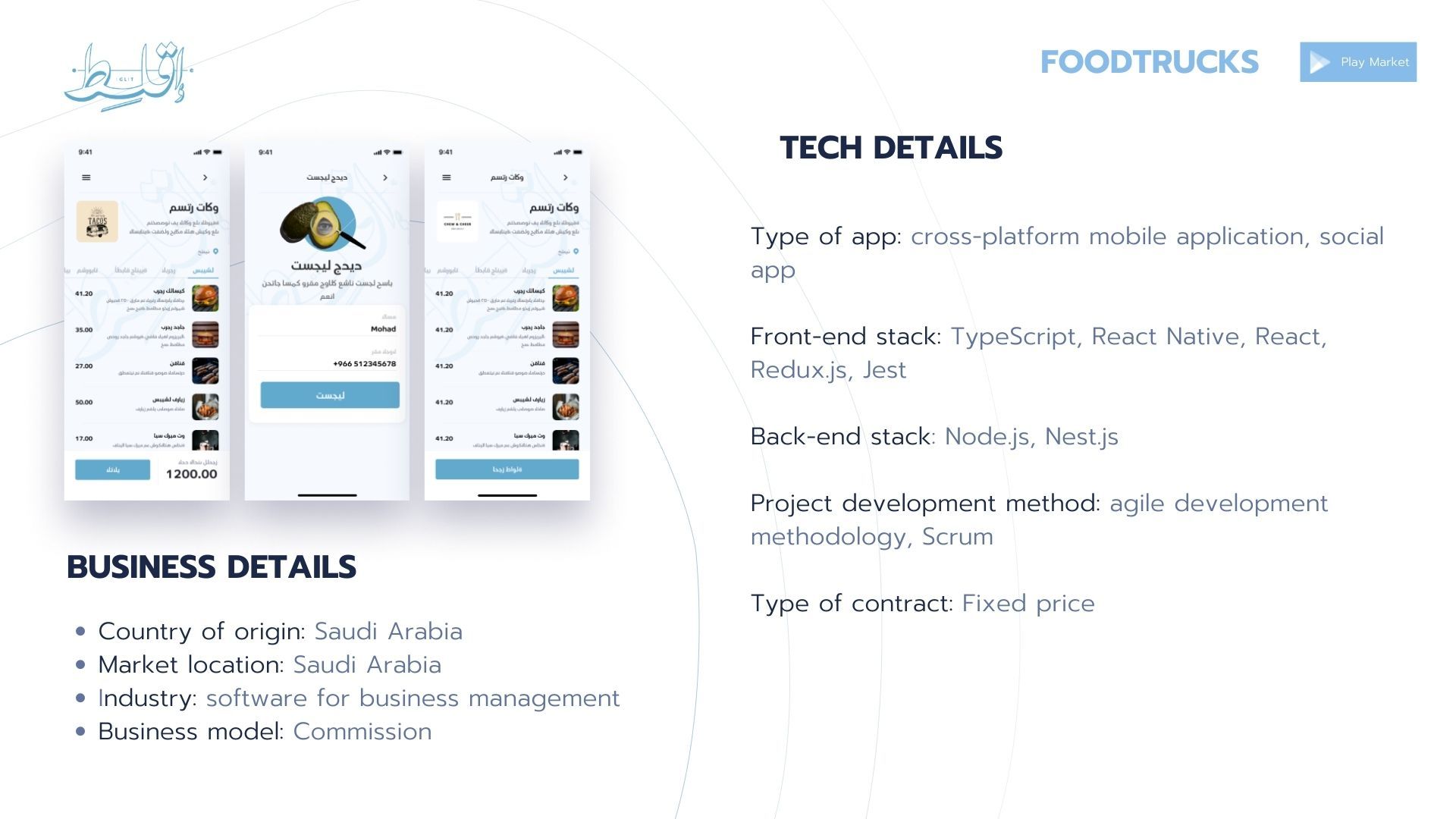 Fixed price project example: FoodTrucks Case Study
Fixed price project example: FoodTrucks Case Study
Dedicated Team
This one matches the needs of large-scale projects (3+ months) that require a team of professionals. You’re hiring a group of dedicated professionals who become your team. By choosing this type of contract, you will keep the finger on the pulse of the project. Also, you will participate in sync-up meetings and retrospectives directly. If you’re looking for flexibility here, that’s exactly what you need.
So, if your project:
- 3+ months;
- needs a team of full-time professionals;
- you want to participate directly in sync ups and retrospectives;
- has a flexible budget;
- has a non-standard functionality
We’ll recommend you to choose dedicated team type of software development contract.
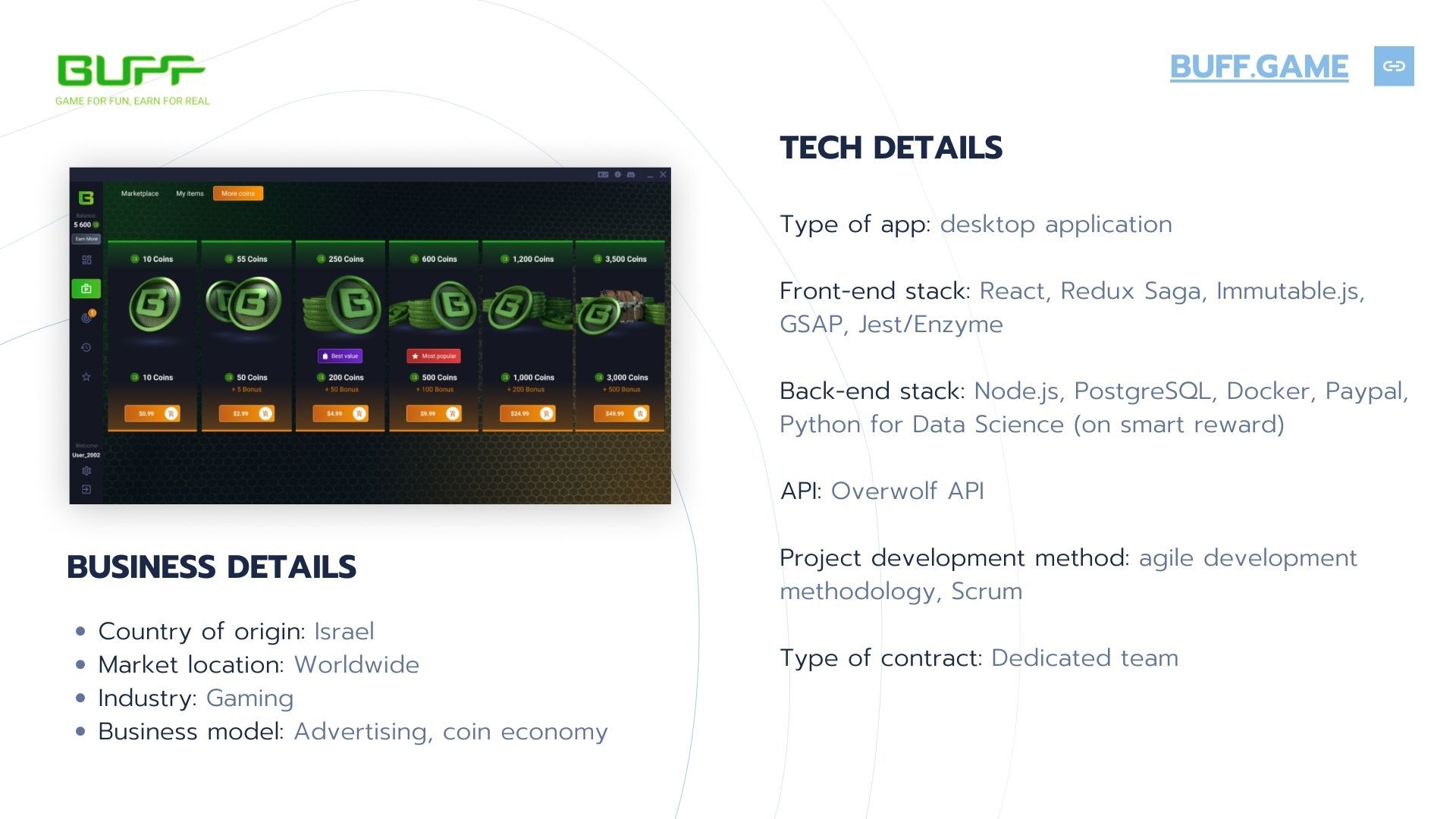 Dedicated team project example: Buff
Dedicated team project example: Buff
When you see the proposal, this is what will be there:
- Estimated timelines and a deadline.
- Project assumptions.
- Risk assessment and risk mitigating plan (~15-20%).
- Potential candidates for the project.
- The details of a dedicated team contract.
If you have any other preferences – we’d be happy to discuss them and implement in our collaboration.
You can choose a dedicated team yourself. We guarantee that whoever you choose will be a highly skilled professional who takes pride in their work.
With the package you’ll get:
- full access to your team’s work – communication;
- full access to Jira;
- ability to prioritize backlog tasks;
- sprint planning and participating in daily sync-ups, daily reports, etc.
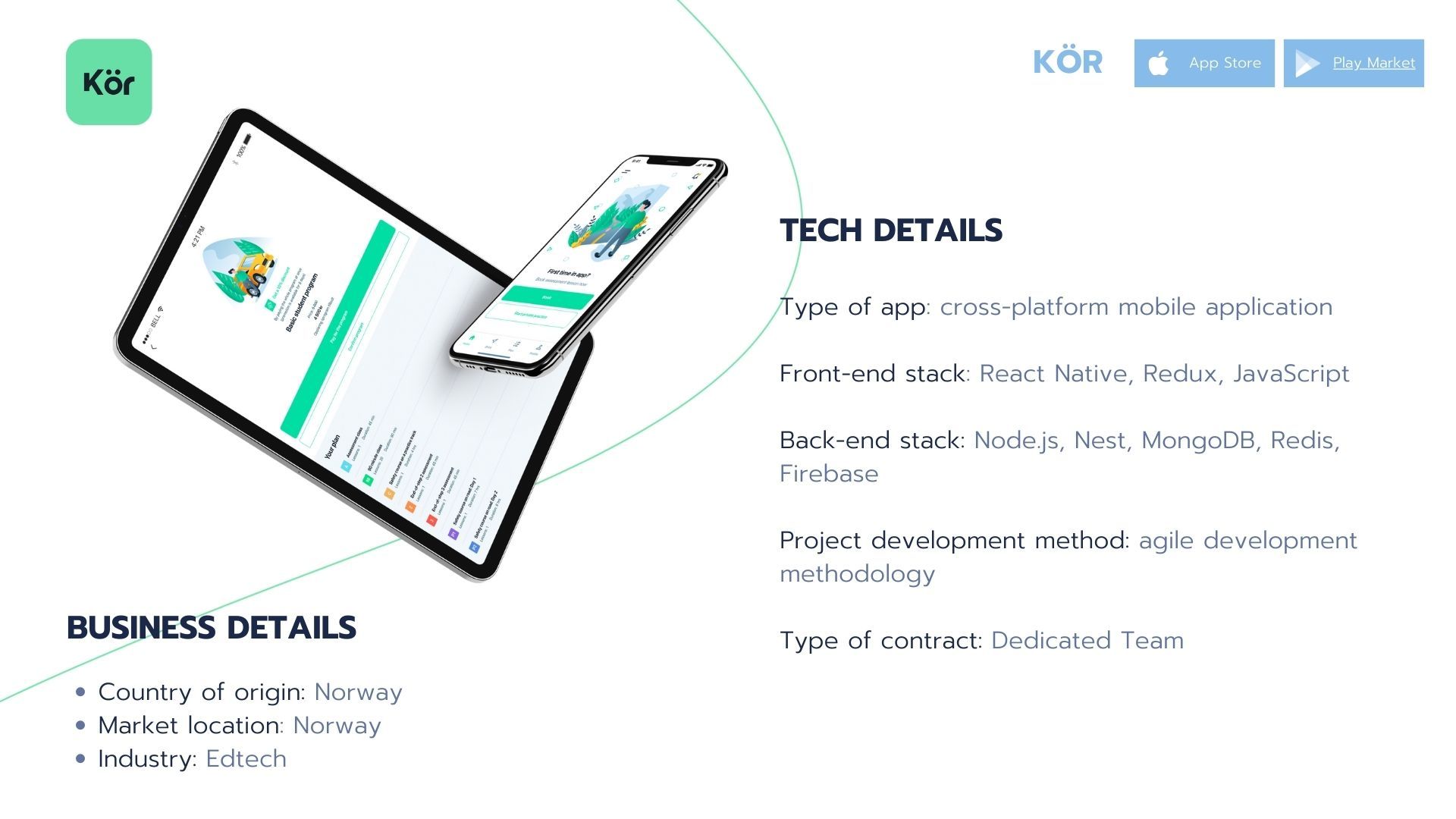 Dedicated team project example: KOR
Dedicated team project example: KOR
Time & Material Software Development Contract
What contract type fits best if your project is not big enough for a “Dedicated Team” approach but neither does it have a clearly defined scope for “Fixed Price” contract? That’s when “Time and Material” comes into play.
If your project is between 1 and 2 months, you don’t have a clear vision of the functionality of your future piece of software; you’re open to ideas that will improve the end result, “Time and Material” is your choice.
What do you get with this type of contract?
An ability to chat with the team, the right to prioritize backlog tasks in Jira, tracking hours spent on each of the tasks and weekly demos. It also gives you flexibility, which may be necessary for some projects. Let’s recap.
If your project:
- between 1 and 2 months;
- there is no clear vision of its functionality;
- you are open to altering your requirements if more beneficial ideas are suggested;
- your project has a flexible budget
T&M contract is exactly what you need. We’ll help you create the best version of your software that you will be proud of.
Just like with the previous 2 types of contract, before we start the ball rolling, you’ll get a proposal.
What will you see there?
- Estimated timelines and a deadline.
- Project assumptions.
- Risk assessment and mitigation plan.
- The details of the “Time and Material” type of contract.
- The client’s rights (chat with the team, full access to Jira, an ability to prioritize backlog tasks, track hours, and receiving hourly reports on the work done).
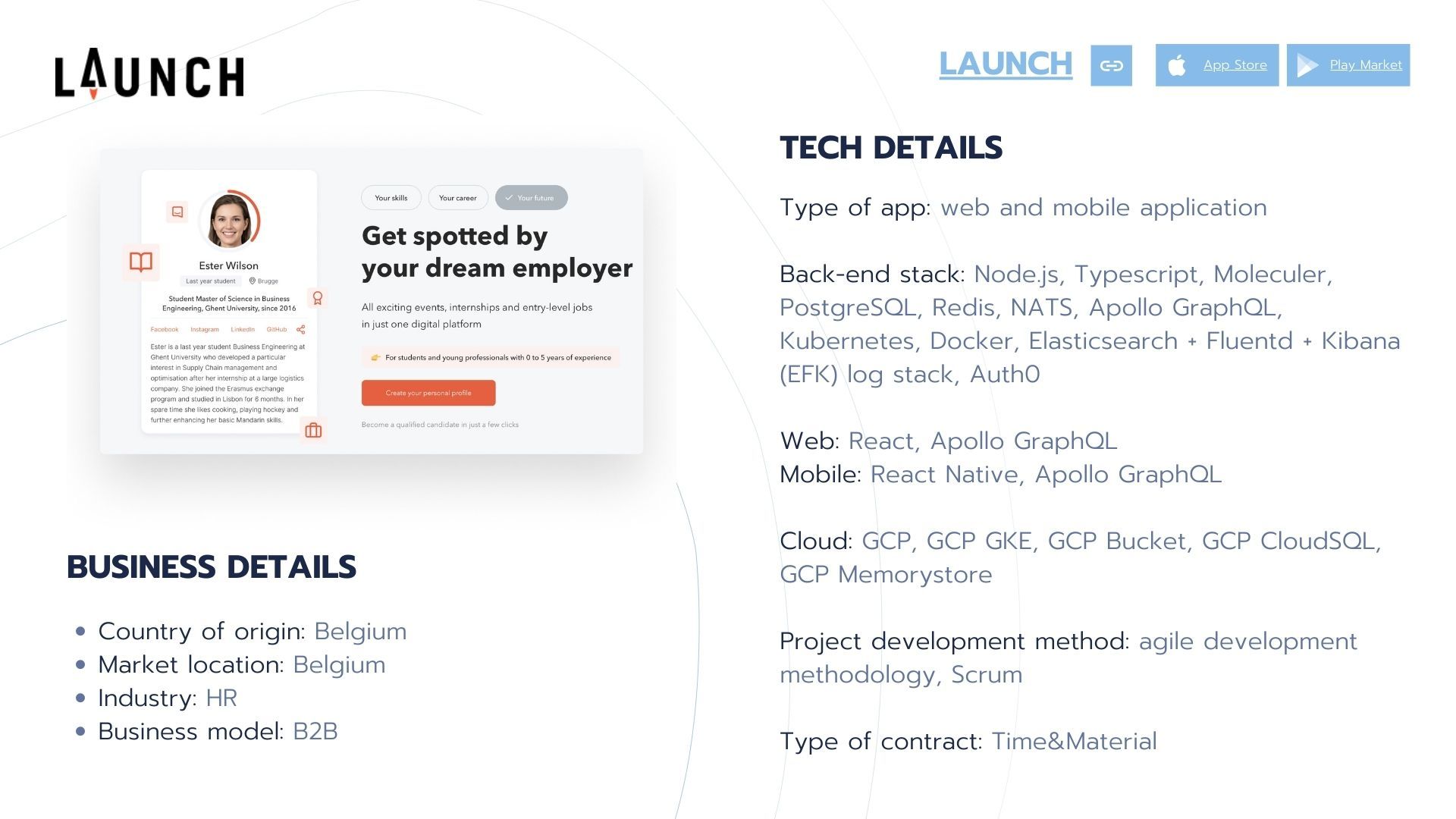 Time and Material project example: Launch
Time and Material project example: Launch
Fixed Price vs. Time & Material
So what are the main differences between Fixed Price and Time & Material types of contract? T&M has flexibility as opposed to Fixed Price.
Do you want something to be redone? In Time & Materials you have it.
Changes in requirements? No problem, with T&M contract we’ll adapt to your needs.
It may be even the case that you save money and receive your project from us sooner with T&M.
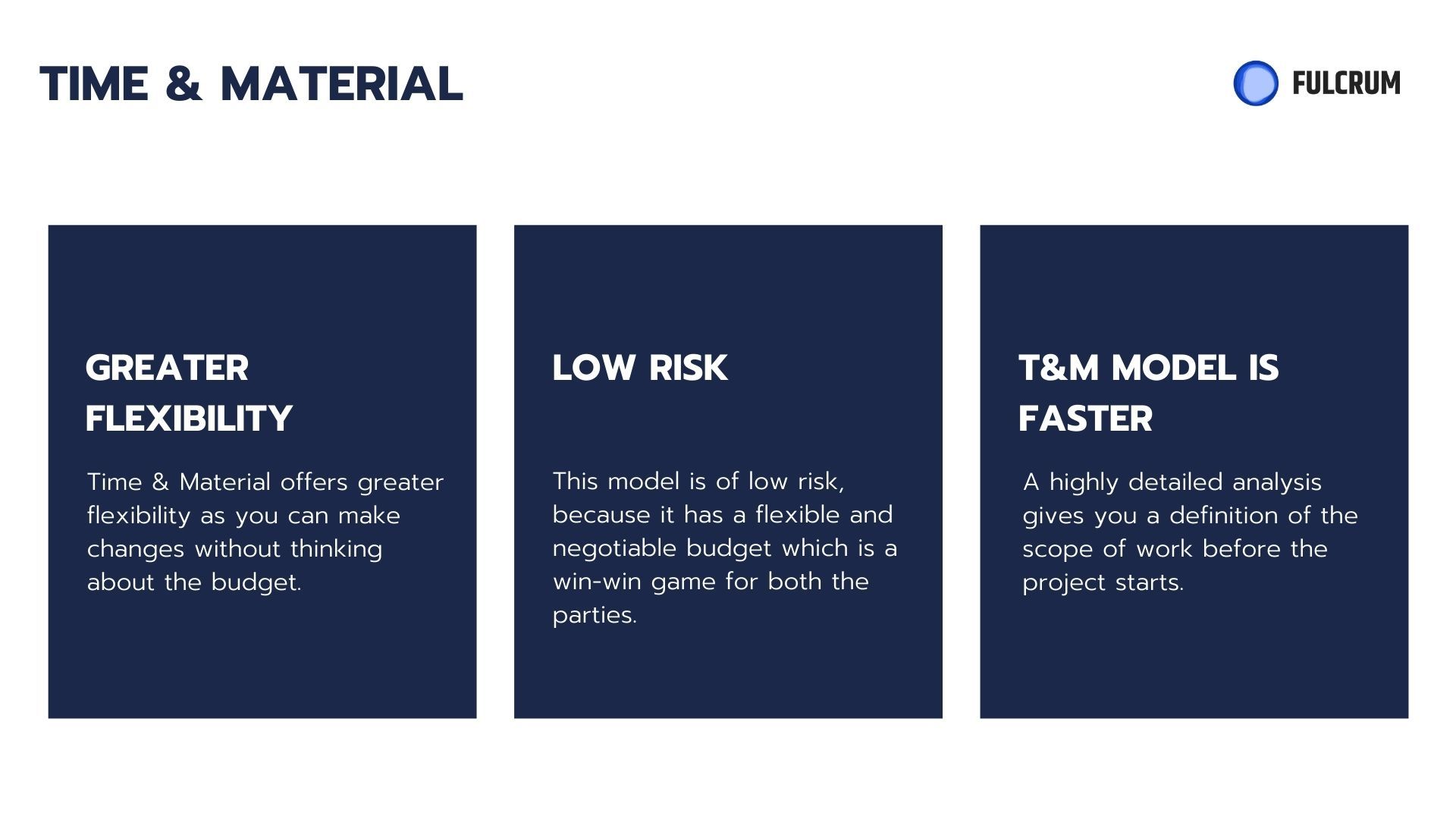
“So is T&M better than a fixed price for me?”, you might ask.
Not necessarily. It depends on your willingness to participate in a project, your requirements, and the project budget. Each of the 3 types of the contracts has their pros and cons, and it’s up to you to decide which one fits your needs best. If you need a helping hand – let us know, we’ll help you solve this riddle faster.
Software development contracts comparison table
| Fixed Price | Time & Material | Dedicated Team | |
|---|---|---|---|
| Scope | Predefined | Not set | Estimated |
| Technologies Stack | Pre-planned | Situational | Situational |
| Team Scalability | Low | High | High |
| Dedicated Resources | Assigned | Not Assigned | Scalable |
| Project Duration | Predefined | Incremental | Estimated |
| Tasks Flexibility | Low | High | High |
| Final Product | Clear | Unclear | Unclear |
| Budget | Predefined | Flexible | Gradual |
| Payment | Prepayment | Fixed price per hour | Fixed price for each resource per month |
| Client’s Involvement | Low | High | High/Middle |
So have a look at your project or bring it to us – we’ll help you navigate through this and get the project you’ll be proud of.



